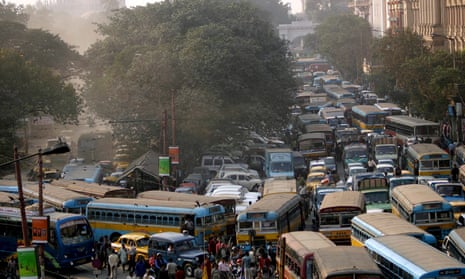India has introduced a new tax on car sales aimed at helping fight high levels of air pollution and congestion.
The surprise move, announced by the finance minister, Arun Jaitley, is a victory for campaigners and a defeat for the powerful car industry.
Commentators said the move showed how attitudes to car use had changed in India. “There are some things that are politically palatable now that were not before. Jaitley has seen there is political space and public support. Once Indians owning cars was seen as a sign of economic success. Now this sort of tax is seen as Indians being responsible,” said Samir Saran, of the Observer Research Foundation, a Delhi-based thinktank.
India is home to many of the most polluted cities in the world, with levels of harmful particles in Delhi, the capital, regularly exceeding European and US safe limits by 15 or 20 times.
Medical experts have predicted huge health problems as tens of millions of children grow up breathing very poor air.
This is an important step forward,” said Anumita Roychoudhry, of the Centre for Science and Environment in Delhi. “[The] finance minister has finally integrated polluter pays principle with fiscal policy to slap a pollution [levy] on all cars [which] is more than double on diesel cars and four times more on SUVs compared to petrol cars. This is needed to address the fuel tax distortion in the market that favours polluting technologies and fuels like diesel.”
Municipal authorities in Delhi and elsewhere have struggled to cope with the problem, hampered by political infighting, poor law enforcement and public ignorance.
After a particularly severe bout of pollution last year, the chief minister of Delhi, Arvind Kejriwal, announced a scheme to cut traffic, and thus pollution, by allowing cars with licence plates ending in odd and even numbers to drive only on alternate days. Two coal-burning power stations were also shut.
The measures are to be repeated in April. Though it made little impact on pollution levels, the scheme was credited with raising consciousness of the problem across the country and seen as a success.
In his annual union budget, Jaitley imposed a sales levy of up to 4% on new passenger vehicles, effective immediately, spurring a selloff by investors in stocks in some of India’s biggest automobile companies such as Maruti Suzuki India Ltd and Tata Motors.
The budget appeared aimed largely at India’s massive rural population, possibly with an eye on forthcoming state elections. Winning these might help the BJP overcome political opposition to their reform plans at national level.
“This was a political budget. People are suffering. India has had two years of poor monsoons, which have hit farmers and the government have to be seen as responsive,” said Saran, the analyst.
The lack of radical measures will disappoint some foreign investors and observers who have long hoped India would implement major reforms to boost the economy in the south Asian power.
Despite a landslide victory in 2014, the Bharatiya Janata party (BJP) government has been unable to push through a series of key measures to spur faster growth.
The new car tax is a further blow for automakers, coming after the supreme court temporarily banned the sale of large diesel cars in Delhi. Campaigners dismissed that move as too little too late.
The new tax imposes a 1% tax on cars less than four metres in length and with engines smaller than 1,200cc that run on petrol, liquified petroleum gas or compressed natural gas.
Small diesel cars less than four metres long and with engines below 1,500cc will be taxed at 2.5%, and bigger diesel vehicles at 4%.
It is estimated that the tax will generate 30bn rupees ($439m or £316m) in revenue for the government.
RC Bhargava, chairman of Maruti Suzuki, which sells one in every two cars in India, told Reuters the industry was being unfairly singled out in the fight against pollution.
Car manufacturers have challenged claims by environmentalists and scientists that up to 40% of pollution in Delhi is caused by vehicle emissions.
The government, separately, plans to levy a tax of 1% on sales of luxury passenger vehicles.
While increasing taxes, India is also expected to spend 970bn rupees over the next fiscal year on improving and building new roads and highways, which carmakers say could partially offset the negative impact.

Comments (…)
Sign in or create your Guardian account to join the discussion